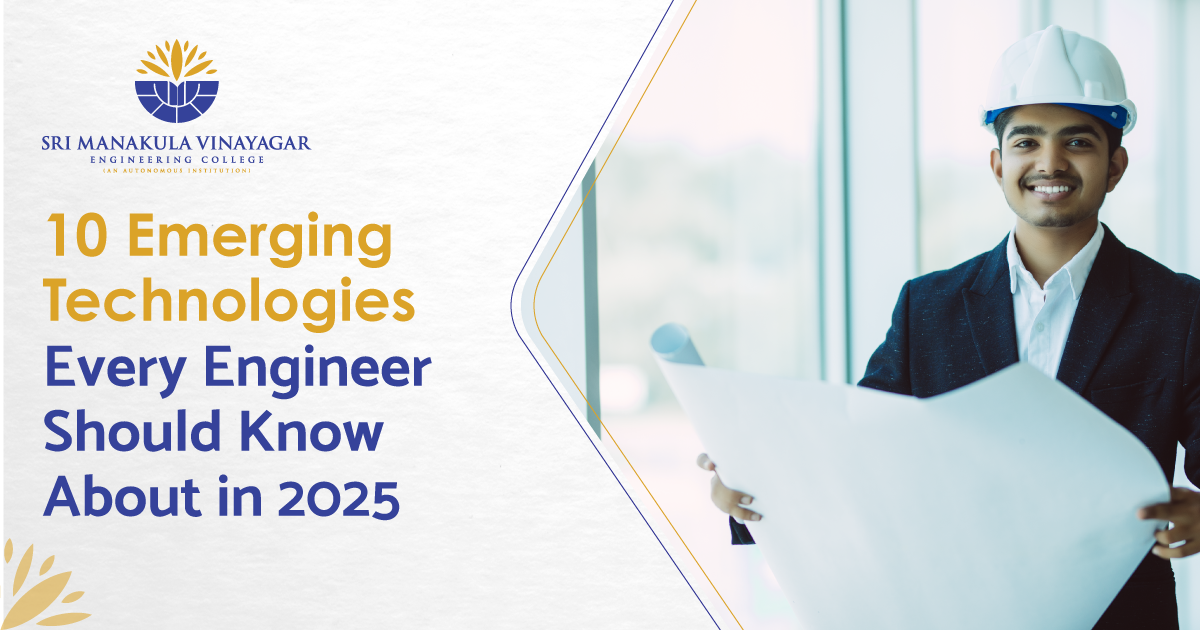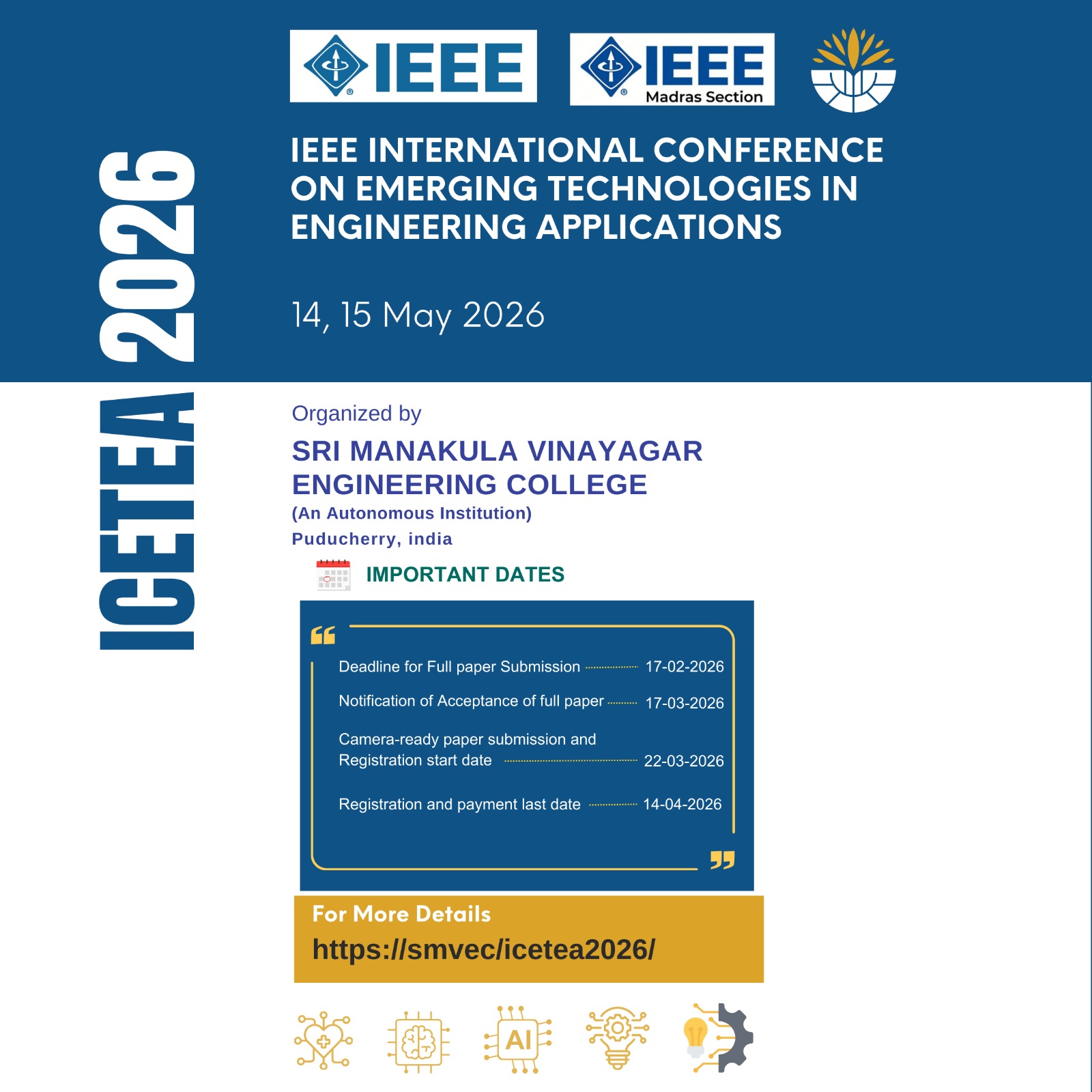Staying up to date with the latest trends and technologies is essential. As we enter 2025, the landscape of engineering technologies continues to evolve at a rapid pace, shaping industries, enhancing productivity, and offering new career opportunities. In this blog, we’ll explore 10 emerging technologies every engineer should know, which will define the future of engineering.
Why Stay Updated with Emerging Technologies in Engineering?
Understanding emerging technologies in engineering is crucial for engineers who aim to stay competitive and relevant in their field. These technologies are tools and transformative forces that change how products are designed, built, and optimised. Engineers must be aware of these advancements to adapt and excel in their respective domains.
As an engineering student at SMVEC College, you are already laying the foundation for your future in this dynamic field. Being proactive about understanding the latest trends in technology can help you remain at the cutting edge of your career.
If you’re specialising in mechanical, civil, computer, or electrical engineering, the knowledge of new engineering technology will be instrumental in your success. Let’s dive into the 10 technologies every engineer should know in 2025
10 Emerging Technologies Every Engineer Should Know About in 2025
1. Artificial Intelligence (AI) and Machine Learning (ML)
AI and ML are rapidly changing engineering disciplines. AI algorithms are being used for predictive maintenance, design optimisation, and automation across various industries. Machine Learning models help engineers in analysing vast datasets and making real-time decisions.
In fields like robotics, AI systems are already performing complex tasks autonomously.
Emerging technologies in engineering, like AI software, can drastically reduce the time and effort required for design and testing, making the process more efficient and accurate.
2. Internet of Things (IoT)
The Internet of Things is another latest technology in engineering that is transforming industries. IoT connects everyday devices to the internet, allowing for real time monitoring and control. For engineers, IoT provides the ability to create smart cities, smart homes, and connected industrial processes.
For example, IoT sensors in manufacturing plants allow engineers to monitor equipment in real-time, predict failures, and optimise performance. New engineering technology, like IoT, is indispensable for those involved in automation and control systems.
3. 5G Technology
The rollout of 5G networks is one of the most anticipated developments in engineering. With speeds up to 100 times faster than 4G, 5G opens up a new world of possibilities for engineers working in telecommunications, robotics, and beyond.
The ultra-low latency and high speed capabilities of 5G networks will enable real time communication for connected devices, which is vital for industries such as autonomous vehicles, remote surgery, and smart manufacturing. Engineers who are proficient in emerging technologies in engineering, like 5G, will be at the top of innovation in this space.
4. Augmented Reality (AR) and Virtual Reality (VR)
Both Augmented Reality (AR) and Virtual Reality (VR) are now crucial components in engineering design and manufacturing. Engineers are using AR to visualise complex data or assembly instructions in real time. VR, on the other hand, is being used for simulations, product testing, and immersive training programs.
By leveraging AR and VR, engineers can explore new designs and make changes in a virtual environment, reducing the need for physical prototypes. As these technologies become accessible, engineers must integrate AR and VR into their workflows to stay competitive in their respective industries.
5. 3D Printing and Additive Manufacturing
3D printing, or additive manufacturing, has completely transformed product development processes. Engineers can now quickly create prototypes or even products by adding material layer by layer, reducing waste and time compared to traditional manufacturing methods.
Emerging technologies in engineering, such as 3D printing, allow for the creation of complex geometries that were previously impossible to manufacture. This technology is gaining traction in industries such as aerospace, automotive, and healthcare.
Engineers should familiarise themselves with new engineering technology like 3D printing to alter the way they approach design and manufacturing.
6. Blockchain Technology
Blockchain, the technology behind cryptocurrencies, is also making its way into the engineering world. This decentralised, immutable ledger system has applications in supply chain, data security, and project management. Engineers are beginning to use blockchain to ensure data integrity, track product origins, and verify transactions across complex supply chains.
For engineers involved in industries that require a high level of data integrity, blockchain offers a way to securely store and share information without the risk of tampering. Understanding how to incorporate emerging technologies in engineering, like blockchain, into processes will provide engineers with a unique skill set that’s in high demand.
7. Quantum Computing
While quantum computing is still in its early stages, its potential to shift industries is immense. Quantum computers can solve complex problems that are currently unsolvable by classical computers, such as simulating molecular structures for drug discovery or optimising large scale supply chains.
For engineers, quantum computing offers the possibility of solving highly complex calculations more efficiently. Though it may take some time for quantum computing to become mainstream, engineers who start learning about this new engineering technology now will be ahead of the curve.
8. Robotic Process Automation (RPA)
Robotic Process Automation (RPA) is a form of automation that uses robots or ‘bots’ to handle repetitive, rule based tasks in software systems. Engineers working in software development, IT, and systems design are leveraging RPA to automate mundane tasks such as data entry, report generation, and customer service responses.
By learning to implement RPA into systems, engineers can save time, reduce errors, and improve overall efficiency in business processes. This latest technology in engineering is expected to play a major role in improving operational efficiency across industries.
9. Energy Storage Technologies
As the world moves towards renewable energy sources, energy storage technologies have become critical for balancing supply and demand. Engineers are developing advanced energy storage systems such as lithium-ion and solid-state batteries and even hydrogen fuel cells.
Energy storage is crucial for sectors like electric vehicles (EVs) and smart grid systems, where reliable and sustainable energy storage is needed for optimum performance. Engineers who specialise in new engineering technology, such as energy storage, will be in great demand as we transition to cleaner, greener energy sources.
10. Self-Healing Materials
Self-healing materials are one of the most exciting emerging technologies in engineering. These materials can automatically repair themselves when they are damaged, which is particularly useful in fields such as aerospace, civil engineering, and automotive manufacturing.
By integrating self-healing materials into designs, engineers can reduce maintenance costs, improve the longevity of products, and improve the safety of structures. This latest technology in engineering has the potential to redefine the way we approach material science and structural integrity in engineering.
Final Thoughts
The 10 technologies every engineer should know in 2025 are transforming industries and offering engineers incredible new opportunities to innovate and solve complex challenges. At SMVEC College, we strive to provide our students with the latest knowledge and practical experience in emerging technologies in engineering.
By familiarising yourself with new engineering technology like AI, IoT, blockchain, and 3D printing, you can be ready to take on the challenges and opportunities that lie ahead. Equip yourself with the knowledge of the latest technologies in engineering today, and you’ll be prepared for the exciting engineering challenges of tomorrow.
FAQs:
1. What are the key emerging technologies every engineer should be aware of in 2025?
In 2025, engineers should be familiar with technologies like Artificial Intelligence (AI), Machine Learning (ML), Internet of Things (IoT), 5G networks, Augmented and Virtual Reality (AR/VR), 3D printing, Blockchain, Quantum computing, Robotic Process Automation (RPA), Energy storage technologies, and Self-healing materials.
2. How can Artificial Intelligence (AI) and Machine Learning (ML) impact the engineering industry?
AI and ML are transforming engineering by enabling smarter design, predictive maintenance, and automation. Engineers are using these technologies to analyse large datasets, optimise designs, and improve the accuracy and efficiency of various engineering processes.
3. What role does 5G technology play in the future of engineering?
5G technology will revolutionise communication networks by offering faster speeds and lower latency. Engineers will leverage 5G to enable real-time data sharing, improve connectivity in smart cities, and enhance industries like autonomous vehicles, healthcare, and manufacturing.
4. How is 3D printing transforming engineering and manufacturing?
3D printing, also known as additive manufacturing, is changing the way engineers approach design and production. This technology allows engineers to create highly detailed prototypes and parts quickly and efficiently, reducing waste and cost.
5. What is Blockchain technology, and how is it used in engineering?
Blockchain technology is a secure and decentralised ledger system that ensures data integrity and transparency. Engineers are using blockchain in supply chain management, project management, and data security to track assets, ensure the authenticity of materials, and verify transactions.




